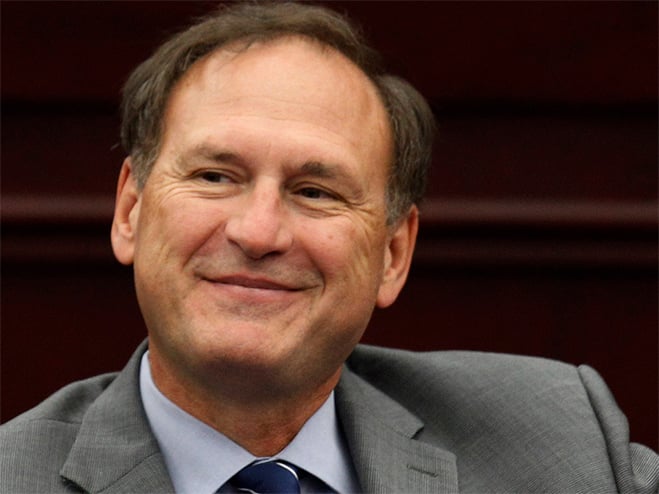If the mysteriously leaked draft opinion by Justice Samuel Alito in Dobbs v. Jackson Women’s Health Organization becomes the official decision of the United States Supreme Court, it will be the greatest victory for sensible constitutional jurisprudence in at least five decades.
As everyone now knows, the draft opinion would overrule Roe v. Wade (1973), the notorious decision in which the Supreme Court discovered a previously unknown constitutional right to terminate a pregnancy before fetal viability. It would also overrule the whole line of federal abortion cases, and in particular Planned Parenthood v. Casey (1992), the very dubious Supreme Court decision both sustaining Roe and weakening Roe’s arbitrary trimester restrictions, which had set essentially no restrictions on abortion during the first trimester of pregnancy, some in the second, and more in the third. In Casey, an even more dubious and incoherent standard was set that forbid all restrictions that create an “undue burden” on a woman’s decision.
In nontechnical language, what Alito’s draft opinion represents is a return to a common sense approach to the Constitution, earlier advocated by the late Justice Antonin Scalia, who had memorably told his fellow justices in his dissent in Casey, “We should get out of this area, where we have no right to be, and where we do neither ourselves nor the country any good by remaining.” As Scalia understood, the Court had no right to rule on the constitutionality of abortion restrictions because 1) the Constitution says nothing about abortion, and 2) the Tenth Amendment to the Constitution makes clear that the powers not granted to the federal government are reserved to the states and their people.
Alito’s opinion appears to be a great victory for the most basic paleoconservative constitutional principles: federalism (i.e. the notion that the government closest to the people—the state governments—ought to be the most responsible for domestic law) and separation of powers (i.e. the idea that law-making is for legislatures and not for justices spinning constitutional rights out of whole cloth).
The leaked draft was greeted with horror by the progressive left, which sought to paint the opinion as a fascist and misogynistic attack on the rights of women. This outcry among the left makes little sense, since the right to an abortion was a fabricated one and since all the decision would do is return the question of abortion’s legality to the 50 individual states. Or, as Scalia once put it, to the people themselves.
The left fears that Dobbs would inevitably lead to the erosion of other progressive Supreme Court decisions, such as those permitting contraception, single-sex marriage, consensual homosexual conduct, Obamacare, or (even more terrifying) those cases forbidding prayer or Bible reading in our public schools. One could, of course, make a powerful constitutional argument that the Tenth Amendment and federalism do compel the return of all of these issues to the state and local governments, but Alito was careful to indicate that Dobbs was about abortion, and nothing else.
As astonishing as the reversal of 50 years of Supreme Court error was, even more amazing—and perplexing—was the fact that someone (most probably one of the nine justices or one of their clerks) decided last week to leak the draft opinion to Politico, and it was quickly promulgated all over the internet. While rumors about Supreme Court decisions had been leaked before, no actual draft opinion had ever been circulated outside the Court. Chief Justice Roberts gravely directed the Court’s Marshal to find and expose the leaker, but the devious deed, of course, cannot be undone.
The left and the right appear divided about the motive for such an unprecedented betrayal of Court customs and its cherished values of secrecy and collegiality. Some conservatives argue that the leak was obviously an attempt by some radical clerk or justice bent on bringing public opinion to bear against the Court and thereby scaring weak-kneed justices from overruling Roe. Some progressives in turn theorize that going public with the draft was the tactic of a reactionary clerk or justice who believed that such a move would prevent any of the shakier members of the majority from abandoning the position, lest they be accused of unprincipled bowing to the same public opinion.
The incompatibility of these two theories makes one wonder why the opinion was leaked at all. There is a third possibility, however, which is that the leaker is an institutionalist (similar to Roberts) who is concerned about the standing of the Court. Such a person may believe that leaking the opinion (which was likely to be toned down before its official release) would soften the eventual blow of overruling Roe and Casey a few months later, thereby lessening the impact of the decision on the upcoming midterms, and on the Court itself.
Democrats seized on the leak as a means of attempting federal legislation codifying the decision in Roe, but such a measure seems doomed, both because the filibuster would prevent passage in the Senate and because the federalism argument of Dobbs would mean that the federal government had no constitutional basis for legislation regarding abortion. Thus, if such a statute passed, any federal court would have to declare it unconstitutional.
Conservative commentators lamented the leak but were uniform in their praise for Alito’s eloquent repudiation of Roe and Casey, the reasoning of which he quite properly termed “egregious.” Because justices can change their opinions before the final decisions are released, we won’t know for some time whether the Court will adopt Alito’s splendid opinion; the Court is expected to issue its opinion in late June or early July. If Dobbs is the beginning of a trend to eliminate Supreme Court legislation, the republic will stand better for it.



Leave a Reply